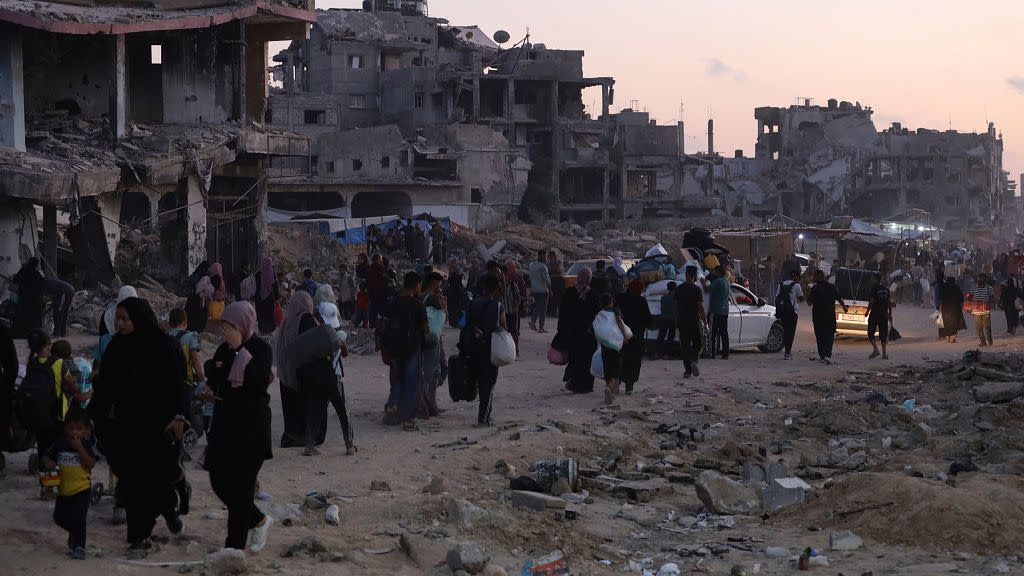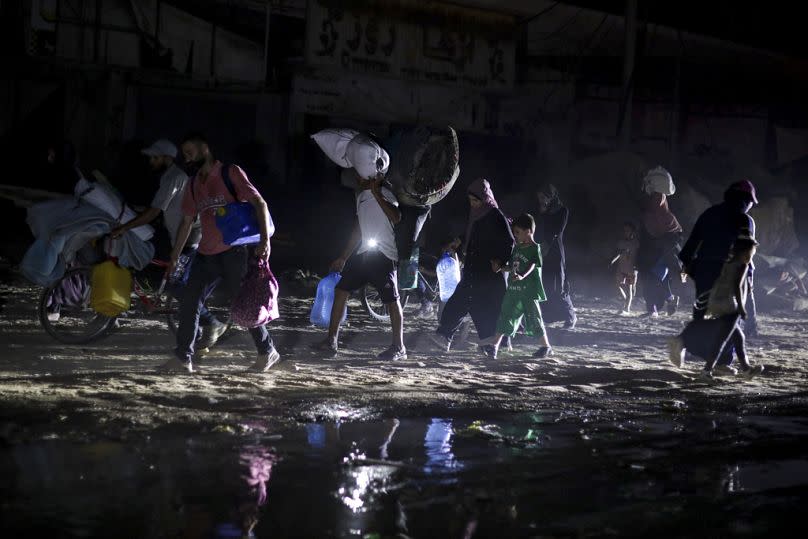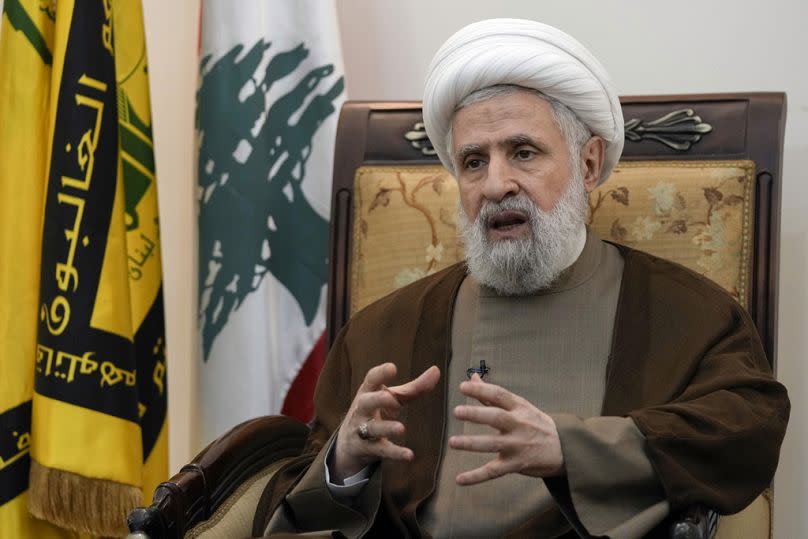Palestinians flee Gaza's second-largest city as Hezbollah demands ceasefire

An Israeli military order for people to leave the eastern half of Khan Younis — the Gaza Strip's second-largest city — has triggered the third mass flight of Palestinians in as many months, throwing the population deeper into confusion, chaos and misery as they scramble once again to find safety.
According to the United Nations, about 250,000 people live in the area covered by the order. Many of them had just returned to their homes there after fleeing Israel's invasion of Khan Younis earlier this year, while others had just taken refuge there after escaping Israel's offensive in the city of Rafah, further south.
The order has also prompted a frantic evacuation at European General Hospital, Gaza's second-largest medical facility.
The hospital shut down after staffers and more than 200 patients were evacuated overnight and on Tuesday, along with thousands of displaced who had sheltered on the hospital grounds, according to both staff and the Red Cross, which had a medical team there.
Hisham Mhanna, the organisation's spokesperson in Gaza, said some families dragged patients in their hospital beds through the streets for up to 10 kilometres to reach safety. Ambulances moved others elsewhere as staff rushed out valuable equipment.
Hours after ordering the evacuation, the Israeli military said the hospital was not in fact included in that order. But the staff said they feared a repeat of previous Israeli raids on other Gaza hospitals.

"Many hospitals have come to rubble and have been turned into battlefields or graveyards," Mhanna said.
Israel has previously raided hospitals, saying Hamas uses them for military purposes — a claim Gaza's medical officials deny.
On Tuesday, cars loaded with personal belongings streamed out of eastern Khan Younis, though the number of those fleeing was not immediately known. The new exodus comes on top of the 1 million people who fled Rafah since May, as well as tens of thousands who were displaced the past week from a new Israeli offensive in the Shijaiyah district of northern Gaza.
Flight from Khan Younis
Monday's evacuation order suggested a new ground assault into Khan Younis could be coming though there was no immediate sign of one. Israeli forces waged a months-long offensive there earlier this year, battling Hamas militants and leaving large swaths of the southern city destroyed or heavily damaged.
Israel has repeatedly moved back into parts of the Gaza Strip it previously invaded to root out militants it said had regrouped — a sign of Hamas' continued capabilities even after nearly nine months of war in Gaza.
The Israeli military said Tuesday it estimates that some 1.8 million Palestinians are now in the humanitarian zone it declared, covering a stretch of about 14 kilometres along Gaza's Mediterranean coast.
'Network trees': This Italian NGO helps keep Gaza connected to the Internet amid war
At least 55 Palestinians detained by Israel in Gaza released
Much of that area is now blanketed with tent camps that lack sanitation and medical facilities with limited access to aid, UN and humanitarian groups say. Families live amid mountains of trash and streams of water contaminated by sewage.
The amount of food and other supplies getting into Gaza has plunged since the Rafah offensive began. The UN says fighting, Israeli military restrictions and general chaos — including looting of trucks by criminal gangs in Gaza — make it near impossible for it to pick up truckloads of goods that Israel has let in. As a result, cargo is stacked up uncollected just inside Gaza at the main Kerem Shalom crossing with Israel, near Rafah.
The Norwegian Refugee Council said last week that in a survey of some 1,100 families who fled Rafah, 83% reported having no access to food while more than half had no access to safe water.
Hezbollah leader insists on Gaza ceasefire
The deputy leader of the Lebanese militant group Hezbollah said Tuesday the only sure path to a ceasefire on the Lebanon-Israel border is a full ceasefire in Gaza.
“If there is a ceasefire in Gaza, we will stop without any discussion,” Hezbollah’s deputy leader, Sheikh Naim Kassem, said in an interview with The Associated Press in Beirut's southern suburbs.
Hezbollah's participation in the Israel-Hamas war has been as a “support front” for its ally, Hamas, Kassem said, and “if the war stops, this military support will no longer exist.”
However, he also said that if Israel scales back its military operations without a formal ceasefire agreement and full withdrawal from Gaza, the implications for the Lebanon-Israel border conflict are less clear.
“If what happens in Gaza is a mix between ceasefire and no ceasefire, war and no war, we can’t answer (how we would react) now, because we don’t know its shape, its results, its impacts,” Kassem said during an interview.
Talks to achieve a ceasefire in Gaza have faltered in recent weeks, raising fears of an escalation on the Lebanon-Israel front. Hezbollah has traded near-daily strikes with Israeli forces along their shared border over the past nine months.

The low-level conflict between Israel and Hezbollah has displaced tens of thousands on both sides of the Israel-Lebanon border. In northern Israel, 16 soldiers and 11 civilians have been killed; in Lebanon, more than 450 people — mostly fighters but also dozens of civilians — have been killed
Hamas has demanded an end to the war in Gaza, and not just a pause in fighting, while Israeli Prime Minister Benjamin Netanyahu has refused to make such a commitment until Israel realizes its goals of destroying Hamas’ military and governing capabilities and brings home the roughly 120 hostages still held by Hamas.
Last month, the Israeli army said it had “approved and validated” plans for an offensive in Lebanon if no diplomatic solution was reached to the ongoing clashes. Any decision to launch such an operation would have to come from the country’s political leadership.
Some Israeli officials have said they are seeking a diplomatic solution to the standoff and hope to avoid war. At the same time, they have warned that the scenes of destruction seen in Gaza will be repeated in Lebanon if war breaks out.
Hezbollah, meanwhile, is far more powerful than Hamas, and is believed to have a vast arsenal of rockets and missiles capable of striking anywhere in Israel.


